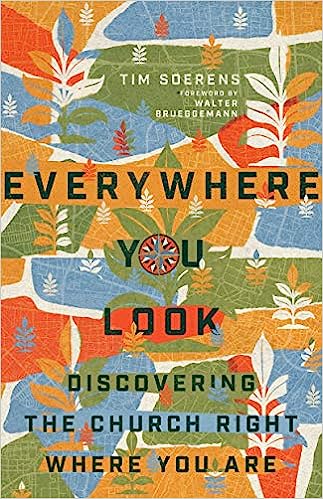Tonight, we are in Chapter 5 “The Parish is the Unit of Change” of Tim Sorens’s book, Everywhere You Look: Discovering the Church Right Where You Are. For tonight, please take about 13 minutes to watch this VIDEO (video #2) from the Parish Collective on what it means to inhabit our parish. This email is available online.
Our Culture:
If the parish is the unit of change, the question is what we are called to create to bring change to the parish. In other words, what does our local congregation look like to bring about change in our parish? In chapter 4 last week, Sorens writes about how the local congregation must inhabit God’s vision of who we should be and not our vision of who we should be. More specifically, Sorens rejects the contemporary understanding that a congregation should be a collection of really cool programs overseen by a great dynamic preacher. In this chapter, Sorens begins to flesh out more what an alternative understanding of the local congregation looks like.
First, we begin with culture not programs or strategies. He defines “culture” as “the most important stories we tell ourselves about how we should live.” p.72. For Sorens, therefore, the primary task of the local church is to build a local culture that others can experience and step into. p.73. This culture is a way of creating a story of how the gospel message is true here, true now, and true in this place. We see this culture in Romans 14, 1 John 4, 1 Peter 1, and Acts 2.
Sorens writes that this culture that we seek to create is not one story of many that we tell ourselves, it is the primary story. Any other story that we have – be it patriotic, about social justice, or anything else – must be secondary to the culture that we create in the local church.
Core Team:
The way to build this culture, according to Sorens, is to start with a core team. As he talks about on pp.77-78, this core team needs to be active in three areas:
It is this Core Team pursuing these three areas which creates and builds the culture. Culture building is not a passive activity but requires intentionality.
Sorens asks us whether or not our Sunday worship service contributes to culture building or not. Is our worship service forming us in such a way so as to cultivate a formative and transformative culture within our congregation and help us meet the three above areas? This is a key question that we all should ask. If Sunday worship is not forming and transforming us to become part of God’s Big Why, then that should necessarily cause us to ask why to we attend that church on Sunday or why should we invite anyone to our congregation. If our worship service is not about spiritual formation to send us out in the world to carry out God’s mission, then our local church is simply an end unto itself.
Inhabiting Our Parish:
This video on “Inhabiting Our Parish” seeks to give some practical insights into what it looks like for the church to care for its neighborhood. The theme of the video is that “We actively inhabit our neighborhood, joining the liberation story of God in, with, and for our place and its inhabitants.” The scripture is Jeremiah 29:4-7 where God tells the exiles in Babylon to settle down in Babylon and seek the welfare of the city.
The idea is that we are not simply to go out into our parish and do some good work. Rather, we are called to become intentionally rooted in our community and to be woven into the life of this community. This means physically going out in the parish, not simply to be of service but to be with others. It means to pay attention and have a sacred curiosity about the people around us. Please try to watch the video before this evening and be prepared to discuss those ways that we can better become woven into the Myrtle Beach community.
MESSIAH NOTES:
This week, Rick Stall, our Senior Warden, and Kristi Burch, the chair of our Steering Committee, are having three listening sessions for you to share any experiences, ideas, and suggestions as we move forward as a parish. These sessions are on Wednesday at noon, Thursday at 9 a.m., and Saturday at 10 a.m.
Dinner is at 6. The menu is Cuban sandwiches and black bean soup. Discussion about 6:45. Compline at 8. Hope to see you here.
Thus says the Lord of hosts, the God of Israel, to all the exiles whom I have sent into exile from Jerusalem to Babylon: Build houses and live in them; plant gardens and eat what they produce. Take wives and have sons and daughters; take wives for your sons, and give your daughters in marriage, that they may bear sons and daughters; multiply there, and do not decrease. But seek the welfare of the city where I have sent you into exile, and pray to the Lord on its behalf, for in its welfare you will find your welfare.
Jeremiah 29:4-7


Pingback: Everywhere You Look, Ch.6: The Same Team, pt.1 – Ancient Anglican
Pingback: Everywhere You Look, Ch.6: The Same Team, pt.2 – Ancient Anglican
Pingback: Everywhere You Look, Ch.7: Learning from Local Heros, pt.2 – Ancient Anglican
Pingback: Everywhere You Look, Ch.8: Already Here, pt.1 – Ancient Anglican